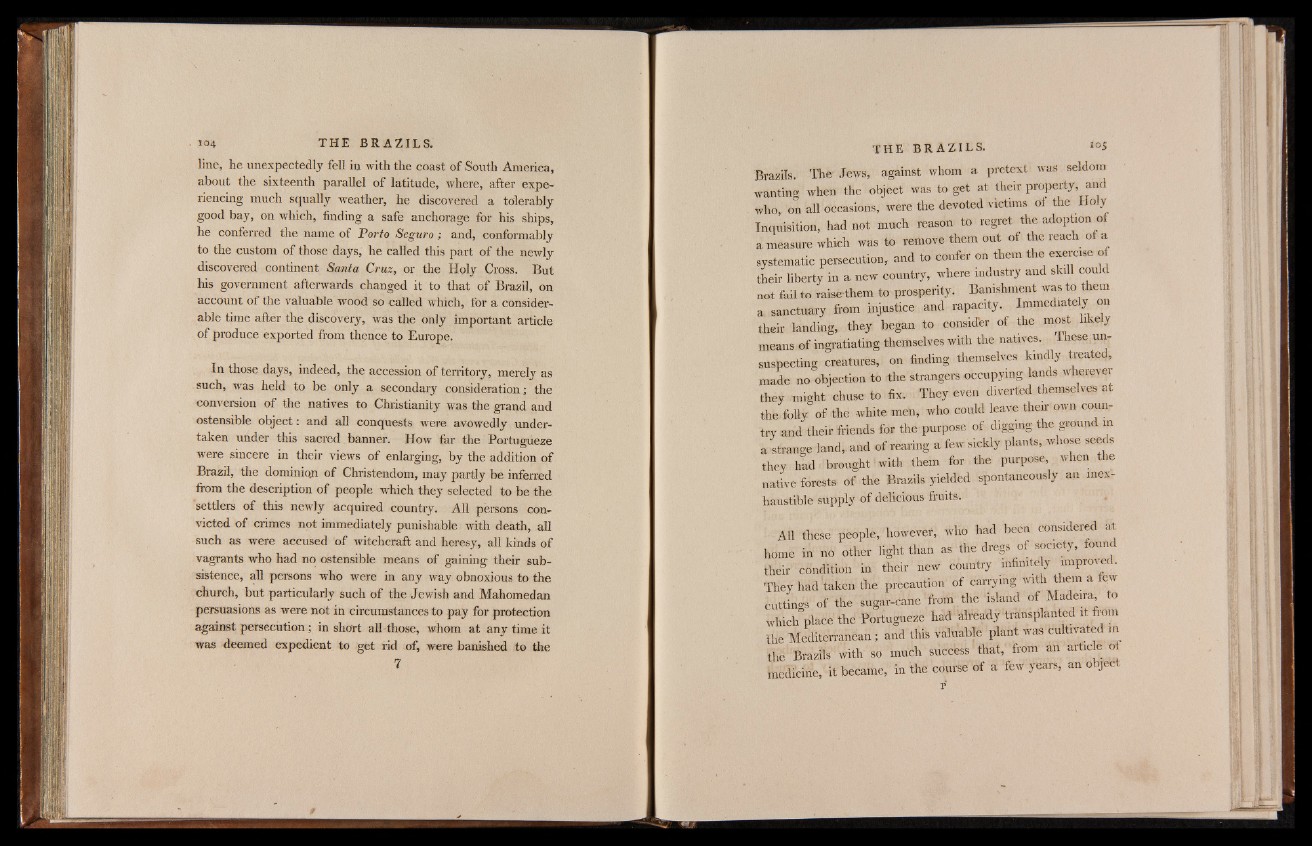
line, he unexpectedly fell in with the coast of South America,
about the sixteenth parallel of latitude, where, after experiencing
much squally weather, he discovered a tolerably
good bay, on which, finding a safe anchorage for his ships,
he conferred the name of Porto Seguro; and, conformably
to the custom of those days, he called this part of the newly
discovered continent Santa Cruz, or the Holy Cross. But
his government afterwards changed it to that of Brazil, on
account of the valuable wood so called which, for a considerable
time after the discovery, was the only important article
of produce exported from thence to Europe.
In those days, indeed, the accession of territory, merely as
such, was held to be only a secondary consideration; the
conversion of the natives to Christianity was the grand and
ostensible object: and all conquests were avowedly undertaken
under this sacred banner. How far the Portugueze
were sincere in their views of enlarging, by the addition of
Brazil, the dominion of Christendom, may partly be inferred
from the description of people which they selected to be the
settlers of this newly acquired country. All persons convicted
of crimes not immediately punishable with death, all
such as were accused of witchcraft and heresy, all kinds of
vagrants who had no ostensible means of gaining their subsistence,
all persons who were in any way obnoxious to the
church, but particularly such of the Jewish and Mahomedan
persuasions as were not in circumstances to pay for protection
against persecution; in short all those, whom at any time it
was deemed expedient to get rid of, were banished to the
7
Brazils. The Jews, against whom a pretext was seldom
wanting when the object was to get at their property, and
who, on all occasions, were the devoted victims of the Holy
Inquisition, had not much reason to regret the adoption of
a measure which was to remove them out of the reach of a
systematic persecution, and to confer on them the exercise of
their liberty in a new country, where industry and skill could
not fail to raise them to prosperity. Banishment was to them
a sanctuary from injustice and rapacity. Immediately on
their landing, they began to consider of the most likey
means of ingratiating themselves with the natives. Theseun-
suspecting creatures, on finding themselves kmdly treated,
made no objection to the strangers occupying lands wherever
they might chuse to fix. They even diverted themselves a
the folly of the white men, who could leave their own country
and their friends for the purpose of digging the ground m
a strange land,, and of rearing a few sickly plants, whose seec s
they had brought’with them for the purpose, when the
native forests of the Brazils yielded spontaneously an inexhaustible
supply of delicious fruits.
All these people, however, who had been considered at
home in no other light than as the dregs of society, foun
their condition' in their new country infinitely improve .
They had taken the precaution of carrying wit 1 t em a
cuttings of the sugar-cane from the island of Madeira to
which pladh the Portugueze had already transplanted it from
the Mediterranean ; and this valuable plant was cultivated in
the Brazils with so much shcCtess that, from an article of
medihme,' it became, in the course of a few years, an objec
P